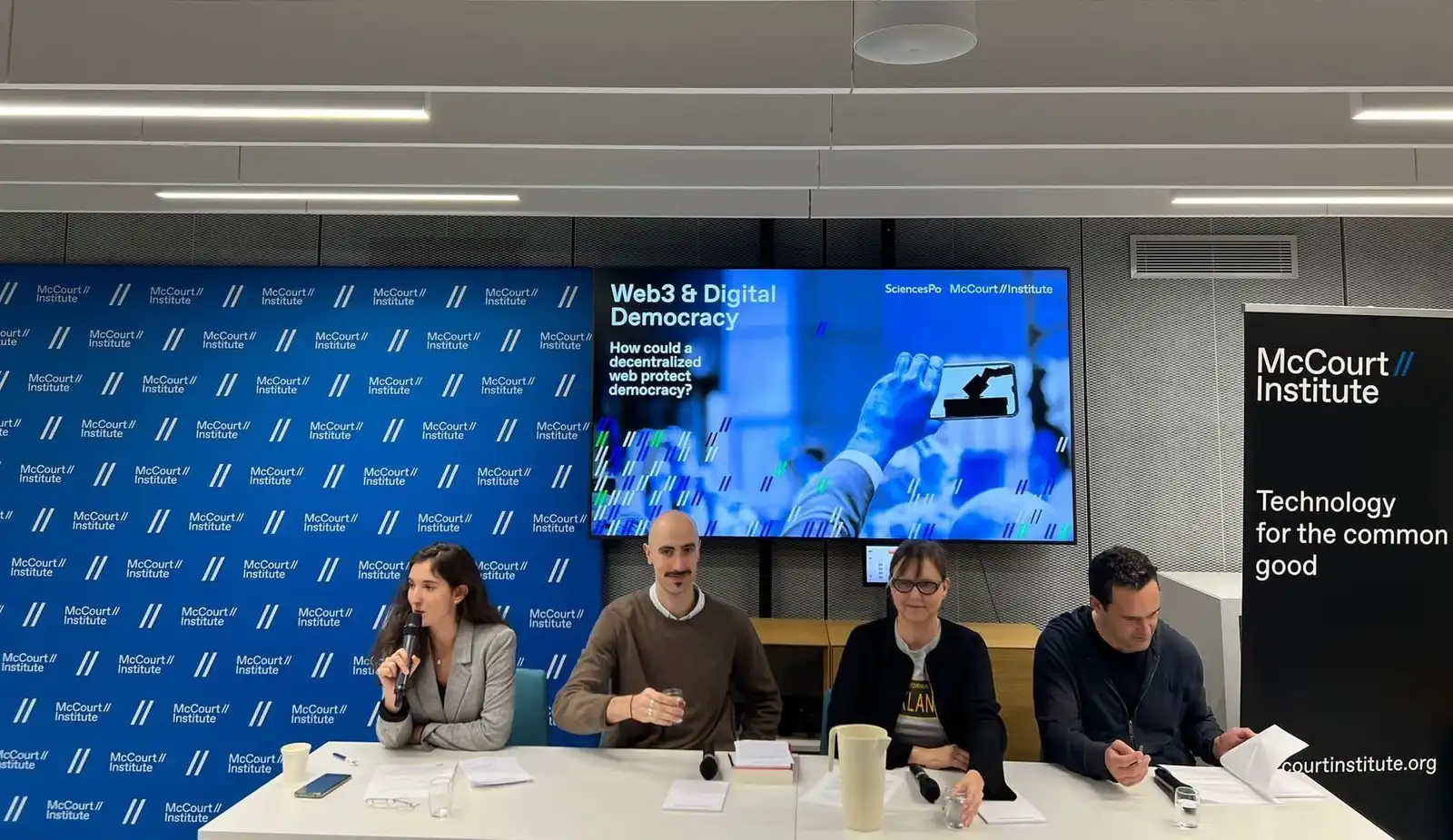Home>The Web3 Series: Can a Decentralised Web Protect the Users of Digital Democracy?
01.12.2022
The Web3 Series: Can a Decentralised Web Protect the Users of Digital Democracy?

As one of the founding partners of the McCourt Institute, Sciences Po believes in its priority: “Tech for the common good”. The main goal of the Institute is to transform the way the internet works, as well as who owns and controls personal data and who benefits from the digital economy. This semester, a new series of events, “Web3 &” was launched to address daily life concepts and their relationship to Web3 and technology. On 15 November 2022, a panel of expert speakers discussed the key topic of Web3 – an internet built on decentralised blockchains – and digital democracy: Jen Schradie, Associate Professor at Sciences Po, Sociologist and Author, Pierre Noro, Lecturer at Sciences Po, Co-founder & President of BubbleBow Project, and Etienne de Saint Marie, Co-founder & CEO of Republike. Leïla Mörch, Senior Program Manager at the McCourt Institute, introduced and moderated the discussion.
The limits of the web as a democratic tool
In her book, The Revolution That Wasn’t, a must-read that was just translated in French, Jen Schradie identified three factors that can explain the differences observed in the “everyday practices of people that are using the decentralised web” : Inequality, Institutions and Ideology. Those factors explain the reason why the internet is not always the “democratic space” one could wish for. The Inequality factor does not allow the poorest users to have the same tools and skills, the Institution factor is in favor of the users groups that are more hierarchical, which allows them to foster more expertise and knowledge, and, last but not least, the Ideology factor means that strong ideologies such as far-right ideas lead to higher levels of engagement.
Societal differences shape people in the way they use technology. (Jen Schradie)
Pierre Noro also expressed doubts about Web3 as a perfect example of equality. The fact that “something is built around a decentralised technology doesn’t mean that it is decentralised”. He criticised the Decentralised Autonomous Organisations’ (DAO) reliance on “token governance, which leads to a model that resembles a plutocracy in which the power pertains to the rich, to the whales”. It is crucial to find and maintain a “common level of trust” and it seems to be easier, with Web3, on finance topics than political ones.
As Etienne de Saint Marie summed it up: “Web3 in itself won’t solve the problem”. He is set against the current social media platforms model, “based on attention economy”. The fact that the platforms send content “to make you react again and again” is what makes them so “polarised” and can be at the root of “violence, censorship, addiction”, which can endanger digital democracy.
Back to reality: when offline gets online
The writer and sociologist Jen Schradie warned the audience against a common mistake: seeing Web3 as a purely virtual space, disconnected from our reality. She claimed: “Let’s not assume that people are isolated from the communities in which they live”. Users should not be seen as “dupes that would believe anything”. It’s actually the “local opinion leaders that can make a difference”. This idea was confirmed by her observations of the far-right groups organisations: they have many real life meetings to discuss their ideas and to vote. Entities such as NGOs, religious groups, owners of the local boulangerie, can be part of “both encouraging or constraining disinformation” (the third event of the Web3 series being about Disinformation). It is imperative to study digital data as well as private spaces and offline spaces.
The real question, raised by Leïla Mörch was, “How to make sure that a technological tool can be for everyone” and “Is there a solution in a capitalist world that doesn’t change itself, that can override the way the world is built”? Web3 exists in a very real capitalist system and the digital democracy possibilities it offers are necessarily limited by this reality.
Can we build new tools to fix democracy when we are using the same logic that has ruined democracy? (Pierre Noro)
Digital democracy needs inclusivity
Pierre Noro, although cautiously, showed optimism in the fact that Web3 and DAO can be used “as tools to represent ecosystems that are based on commons and have no legal identity today, for example forests”. This means that “non-human actors could be represented by using a software to modelise their interests”, such an experiment is currently ongoing with the Loire river in France.
Jen Shradie added that the need for inclusivity in order to represent all populations and improve Web3 is strong. She explained that there should to be “a broader range of people creating those technologies: people that are disabled, that speak different languages, that come from different social classes”. A focus should also be made on “structural issues”,to build a more “horizontal community” with a risk directly linked to the importance of structure, “if a society doesn’t have structure, people are going to fill that vacuum”, and that is what we’re currently witnessing with the rise of far-right groups.
MORE INFORMATION:
- McCourt Institute official website
- Youtube replay of the event
- The Web3 & Disinformation event at Sciences Po on 1 December
Open house days 2026

Virtual Undergraduate Open House day 2026
Come meet our teams and students at our campuses.
Virtual Graduate Open House day 2026
Meet faculty members, students and representatives and learn more about our 30 Master's programmes.